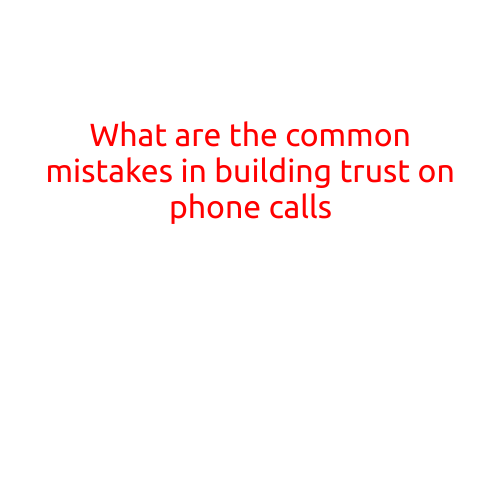
What are the Common Mistakes in Building Trust on Phone Calls?
Building trust is crucial in any business or personal relationship. In today’s fast-paced world, phone calls have become a vital means of communication, especially for professionals and entrepreneurs. However, building trust over phone calls requires a specific set of skills and strategies. Unfortunately, many people make common mistakes that can undermine trust and lead to missed opportunities.
In this article, we’ll explore the most common mistakes people make when building trust on phone calls and provide tips on how to avoid them.
Mistake #1: Lack of Preparation
Failing to prepare for a phone call can lead to a lack of confidence, nervousness, and a sense of being under-prepared. This can be detrimental to building trust, as it may create doubts about your expertise and credibility. To avoid this mistake, make sure you:
- Research the caller’s background and purpose
- Prepare a clear and concise agenda
- Review any necessary materials or data
- Practice your pitch or presentation
Mistake #2: Not Listening Actively
Phone calls can be a great opportunity to build trust by actively listening to the other person. However, failing to do so can create a sense of disinterest and a lack of understanding. Make sure to:
- Pay attention to the caller’s concerns and needs
- Ask open-ended questions to encourage sharing
- Repeat back what you’ve understood to ensure clarity
- Show empathy and understanding
Mistake #3: Talking Too Much
While it’s essential to communicate effectively, talking too much can come across as pushy, aggressive, or controlling. This can lead to a breakdown in trust and a sense of unease. To avoid this mistake:
- Focus on the caller’s needs and concerns
- Ask thoughtful questions to encourage sharing
- Keep your responses concise and to the point
- Avoid dominating the conversation
Mistake #4: Not Being Transparent
Transparency is key to building trust. Failing to be open and honest about your intentions, processes, or outcomes can create doubts and mistrust. Make sure to:
- Be clear about your goals and expectations
- Explain your methods and procedures
- Share success stories or testimonials
- Be willing to admit mistakes and take responsibility
Mistake #5: Being Unresponsive
Failing to respond promptly to calls or messages can create a sense of neglect or disinterest. This can lead to a decrease in trust and a loss of opportunities. To avoid this mistake:
- Respond to calls and messages within a reasonable timeframe
- Return dropped calls or messages promptly
- Keep the caller updated on the status of their inquiry
- Show a willingness to follow up and follow through
Mistake #6: Not Being Authentic
Faking it or trying to be someone you’re not can quickly erode trust. Be genuine and authentic in your interactions, and:
- Be yourself, without trying to impress
- Share your personal story and experiences
- Show your passion and enthusiasm
- Be willing to learn and grow alongside the caller
Conclusion
Building trust over phone calls requires a combination of preparation, active listening, transparency, and authenticity. By avoiding common mistakes and focusing on these key principles, you can build strong, trusting relationships that lead to long-term success.
Remember, trust is built one conversation at a time. Focus on creating meaningful connections, being genuine, and providing value, and you’ll be well on your way to building a strong foundation of trust over phone calls.





